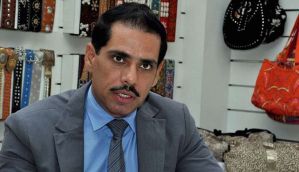Gulberg Society massacre: Court announces quantum of punishment; 11 convicts get life term
The court of special judge PB Desai has pronounced the quantum of sentence for 24 convicts in the Gulberg Society massacre in Ahmedabad today.
Life term has been awarded to 11 convicts, while 7 years imprisonment has been given to those with lesser charges. 1 convict has been awarded 10 years imprisonment.
Sixty-nine people, including former Congress legislator Ehsan Jafri, were killed in a mob attack on the building on 28 February, 2002, a day after a coach of the Sabarmati Express was burnt near Godhra train station, in which 58 kar sevaks returning from Ayodhya died.
On 2 June, the court had convicted 11 people for murder and other offences, while charging 13 others, including VHP leader Atul Vaidya, with lesser offences and acquitting 36 others.
Complaint filed with PMO claims Essar Group tapped phones of VVIPs for five years
A 29-page complaint submitted to the Prime Minister's Office on 1 June claims that the Essar Group spent five years between 2001 and 2006, tapping the phones of highly influential people including cabinet ministers, corporate heads, Mukesh and Anil Ambani, and several bureaucrats.
Conversations purportedly heard during these phone taps show the extent of the nexus between big business and government, says The Indian Express.
The complaint was submitted by Supreme Court lawyer Suren Uppal who had once represented the Essar employee allegedly in charge of the phone taps.
Sabrang Trust to challenge cancellation of FRCA licence
Sabrang Trust, the NGO run by activists Teesta Setalvad and Javed Anand, will challenge the home ministry order that cancelled its licence under the Foreign Contribution Regulation Act, 2010, which prevents it from receiving donations from abroad.
The trust's licence had been suspended for six months last for violating the FRCA, says ANI.
In a statement issued on Thursday, the Sabrang Trust said: "Sabrang will actively explore all legal options to challenge the Home Ministry's order cancelling FCRA registration."
CBFC demands 100 cuts in Gujarati film on Patidar stir
A Gujarati film based on Hardik Patel and the Patidar stir is battling the Central Board of Film Certification which has recommended more than a hundred cuts.
Hardik Patel has been jailed for sedition after leading an agitation in Gujarat last year for reservations for the Patidar community.
The CBFC wants 100 cuts in the film Salagto Sawal: Anamat (Reservation: A Burning Question), which highlights the "ill-effects" of caste-based reservations. It has told the filmmakers to drop the words "Patel" and "Patidar" and objected to the close resemblance of the film's lead actor to Hardik Patel, according to the Hindustan Times.
Pathankot: Terrorists' handler quit JeM and fled to Afghanistan, says Pak JIT
A member of Pakistan's Joint Investigation Team that is looking into the terrorist attack on India's Pathankot air base has said that a Jaish-e-Mohammed handler of the terrorists has reportedly fled from Pakistan to Afghanistan.
"The alleged JeM handler who communicated by telephone more than two dozen times with the terrorists in Pathankot, before they carried out the attack on the airbase on 2 January, has managed to cross into Afghan border," said the official.
He added that the handler had been Pakistan's tribal area when he communicated with the Pathankot terrorists, says the Hindustan Times.
Vikas Khanna dishes up Pope's dinner based on food developed by Indian Christians
Celebrity chef Vikas Khanna served Pope Francis 13 dishes developed by Indian Christians at the Vatican on Wednesday, including bebinca, which was developed by Goan nuns who used egg whites to starch their habits, and the yolks to make sweet dish that evolved over time to become the famous seven-layer dessert.
Khanna said: "It has not sunk in yet that I served the Pope a dish created by the Christians in Goa."
Khanna cooked for Pope Francis after a years-long discussion between them about the hunger initiative, according to the Hindustan Times.
Ancient DNA tells of two origins for dogs
Genetic analyses of a 4,800-year-old Irish dog and 59 other ancient dogs suggest that canines and humans became pals in both Europe and East Asia long before the advent of farming, says a report in sciencenews.org.
Later, dogs from East Asia accompanied their human companions to Europe, where their genetic legacy trumped that of dogs already living there.
Therefore, dogs were domesticated at least twice. That muddled genetic legacy may help explain why previous studies have indicated that dogs were domesticated from wolves only once, although evidence hasn't been clear about whether this took place in East Asia, Central Asia or Europe.
The idea that dogs came from East Asia or Central Asia is mostly based on analysis of DNA from modern dogs, while claims for European origins have been staked on studies of prehistoric pups' genetics.
A 4,800-year-old dog found in a tomb in Newgrange, Ireland, is the first ancient dog to have its entire genetic instruction book, or genome, deciphered. Researchers don't know much about what the midsize dog looked like; it doesn't bear any genetic markers of particular modern dog breeds, Frantz says. "He wasn't black. He wasn't spotted. He wasn't white." Instead, the Newgrange dog was probably a mongrel with fur similar to a wolf's.
Westerners lack education on nuclear disaster risks
Western societies would not respond well to a Fukushima-style nuclear disaster due to a lack of public information, a leading disaster expert has warned. Christopher Abbott told the Guardian he firmly believed that the public ought to be better educated over the hazards and risks they may face. Illustrating his point, he referred to the Fukushima disaster of 2011 in which 160,000 people were evacuated from the vicinity of the plant as experts attempted to tackle the emergency. The evacuation worked, said Abbott, because "the Japanese educate the public". "I just don't see that it would have worked as successfully in western society," he added. "[It's] a very personal opinion but one that is backed up by Japanese colleagues." Abbott, chairman of the Emergency Planning Society CBRN professional working group, made the remarks while giving evidence to a science and technology select committee hearing at the House of Commons on chemical, biological, radiological or nuclear incidents. "We need to better educate the public, because a well-educated public will respond better," he said.







![BJP's Kapil Mishra recreates Shankar Mahadevan’s ‘Breathless’ song to highlight Delhi pollution [WATCH] BJP's Kapil Mishra recreates Shankar Mahadevan’s ‘Breathless’ song to highlight Delhi pollution [WATCH]](https://images.catchnews.com/upload/2022/11/03/kapil-mishra_240884_300x172.png)

![Anupam Kher shares pictures of his toned body on 67th birthday [MUST SEE] Anupam Kher shares pictures of his toned body on 67th birthday [MUST SEE]](https://images.catchnews.com/upload/2022/03/07/Anupam_kher_231145_300x172.jpg)






